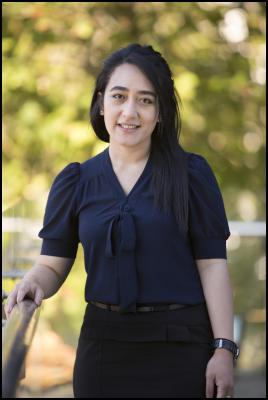First two Pacific academics graduate with PhDs
First two Pacific academics at the Business School graduate with PhDs

Sisikula Sisifa

Ilaisaane
Fifita
The first Pacific academics at the
University of Auckland's business school are two Tongan New
Zealand women, graduating today with
PhDs.
Sisikula Sisifa and Ilaisaane Fifita, both
31, started working as research fellows at the Business
School this year.
"When I was a student, I wished there were Pacific female academics in the business school," said Sisifa.
"Now I get comments from students saying that it's nice to see a brown female face standing at the front of the class."
Fifita said one young male Pacific student told her that having her as an undergraduate tutor had inspired him to do an honours degree.
For Sisifa, her graduation will be bittersweet. She and her family will be immensely proud of her achievements – she’s the first to get a doctorate in her family. But there’s sorrow too. Her management PhD topic and her decision to pursue doctorate were both inspired by her father, Alekisanita Sisifa, who passed away suddenly in her third year.
"He was proud and very supportive when I started," she said. "It's sad he won't be able to bask in this milestone with us."
For her PhD, she examined management practices in five development projects in Tonga, and found cultural differences in thinking about management practices undermined the projects’ success.
Fifita is graduating with a PhD in Marketing. She researched why Tongan and Pakeha female non-smokers don’tsmoke, and hopes her findings will help design of public health campaigns to persuade other women not to take up the habit.
How does it feel being a trailblazing young female academic? Empowering - and a big responsibility.
Fifita: “I feel a responsibility to other Pacific young people, to students, to my own family, nieces and nephews.”
As Pacific women, Sisifa and Fifita intimately understand the obligations to family and church that many Pacific students have to juggle with their studies.
Sisifa says that her family keep her grounded, reminding her she’s a “normal person with flaws” as well as a role model. “My siblings do that on a daily basis.”
Sisifa is the second youngest of four brothers and one sister. Tongan-born, she went to live with her grandmother in Auckland as a pre-schooler, and went back and forth between Tonga and New Zealand during her childhood.
By her mid-teens, the rest of her family had migrated to New Zealand. Her father was the director of the Land Resource Division at the Secretariat of the Pacific Community, a regional development organisation. Her mother, Siulolovao, works in hospitality.
Sisifa went to Auckland Girls Grammar and gained a Postgraduate Diploma and Masters Management at Massey University.
Moving to the University of Auckland was intimidating at first she says. “It’s such a big university, and so prestigious, and you worry you’ll just be a number. But I’ve had a lot of support here, especially when Dad died. It was the best decision I ever made.”
Fifita is the youngest of five, with two brothers and two sisters. She grew up in Tonga, moving to Auckland for her final year of secondary school. Her parents, Tevita Misa Fifita and Hola Fifita, operate a family business in Tonga.
“I grew up watching my parents work hard to build a business from scratch,” she says. “I was always keen to study business and help my family.”
She did a Bachelor of Business and Information Management, a Bachelor of Commerce Honours degree and a Master of Commerce in Marketing at the University of Auckland.
“There is sometimes a perception that marketing is just about advertising, but that’s just one aspect. It can also has be used to improve the consumer’s wellbeing and the welfare of a society.”
Her PhD research promises to do just that. She interviewed 27 Tongan New Zealand and New Zealand European women, to see whether the way a person defines themselves in relation to others influences their motivations for resisting pressure to smoke tobacco cigarettes.
She’d watched family members suffer with, and some die of smoking-related diseases, and worries for her nieces and nephews.
One in four Pacific adults smoke in New Zealand, compared to 15 per cent of New Zealand Europeans and 10 per cent of Asian New Zealanders. And while smoking used to be taboo for Pacific women, it’s now seen as a symbol of independence by some younger women.
It’s assumed that Pacific women’s sense of self is anchored in family – as daughters, sisters, granddaughters, nieces, cousins, wives and mothers, rather than as individuals, she says. Current anti-smoking or quit campaigns targeting Pacific women urge them to quit or resist for the sake of their family, appealing to this “interdependent” self.
But the Tongan women in her study also had an independent sense of self alongside the interdependent one, and their reasons for not smoking or quitting arose from both.
“It’s important to highlight both family values and empowerment and independence to young Pacific women to increase their ability to say ‘no’ to smoking, especially in situations of peer pressure,” says Fifita.
Her supervisor, Associate Professor of Marketing Karen Fernandez, says she’s “extremely” proud of Fifita’s work.
Fifita is now applying for funding for research into e-cigarettes and alcohol consumption.
Sisifa’s PhD research found that cultural differences in thinking about management practices undermine the success of development projects.
“Many of the projects implemented in Tonga don’t yield the outcomes envisioned at the outset,” she says. “Project management practices and frameworks play an integral role in facilitating good development outcomes, but are often overlooked.”
With Tonga receiving a substantial amount of donor aid funding towards development projects, the wasted potential is significant.
“Donor agencies and international consultants need to understand there are cultural nuances and adapt their practices. The different Tongan ministries need to make their systems more efficient and effective,” she says.
Sisifa’s supervisor, Professor Nigel Haworth, says her research is “innovative and even path-breaking, and expertly handled”, calling her a “first-class teacher”.
Both women intend to pursue a career in academia.


 Angela Wanhalla & Jacinta Ruru, The Conversation: Books Of Mana - 10 Essential Reads For Waitangi Day
Angela Wanhalla & Jacinta Ruru, The Conversation: Books Of Mana - 10 Essential Reads For Waitangi Day FASD-CAN: People With Fetal Alcohol Spectrum Disorder (FASD) Dismayed At Government’s Response To The Rights Of Disabled People
FASD-CAN: People With Fetal Alcohol Spectrum Disorder (FASD) Dismayed At Government’s Response To The Rights Of Disabled People NZ Opera: Jane Austen Opera Coming To Christchurch & Dunedin - South Island Premiere | NZ Opera’s Mansfield Park Returns This April
NZ Opera: Jane Austen Opera Coming To Christchurch & Dunedin - South Island Premiere | NZ Opera’s Mansfield Park Returns This April Sport Manawatū: Women’s Health Series Empowers Women To Prioritise Their Wellbeing
Sport Manawatū: Women’s Health Series Empowers Women To Prioritise Their Wellbeing Pure Adventure Charitable Trust: Iconic One New Zealand GODZONE To Make Triumphant Return To New Zealand’s Adventure Racing Scene
Pure Adventure Charitable Trust: Iconic One New Zealand GODZONE To Make Triumphant Return To New Zealand’s Adventure Racing Scene The Charter School Agency: New Charter Schools Open Doors To First Students
The Charter School Agency: New Charter Schools Open Doors To First Students 